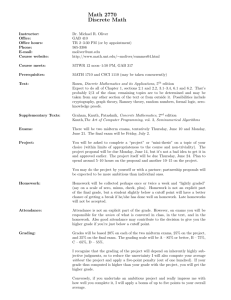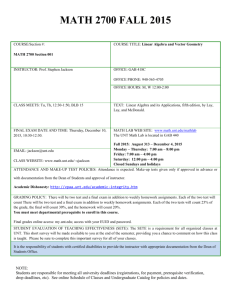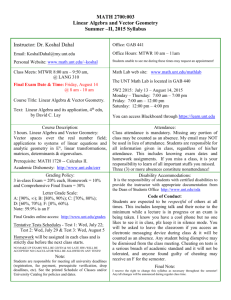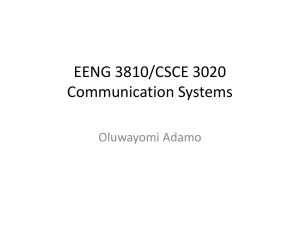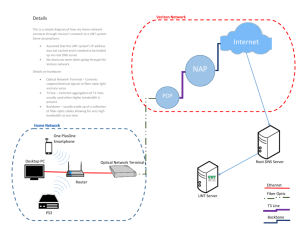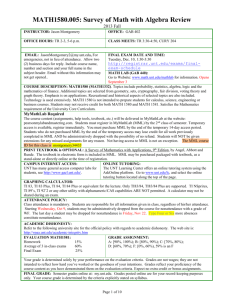1710.005spring11 - Department of Mathematics
advertisement
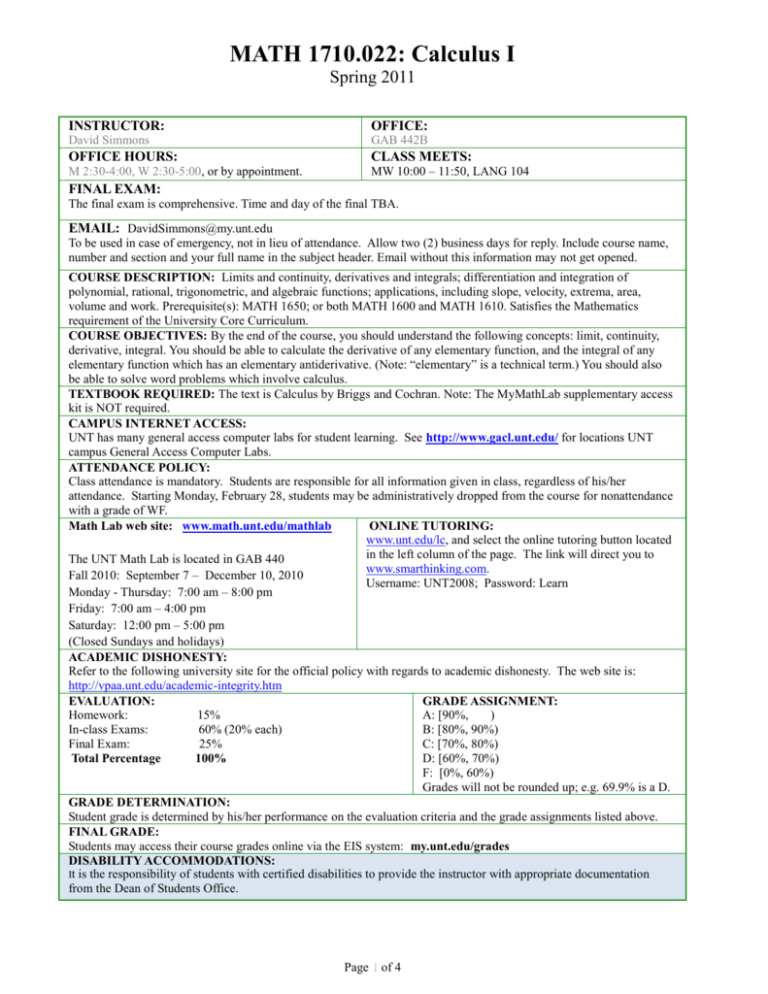
MATH 1710.022: Calculus I Spring 2011 INSTRUCTOR: OFFICE: David Simmons GAB 442B OFFICE HOURS: CLASS MEETS: M 2:30-4:00, W 2:30-5:00, or by appointment. MW 10:00 – 11:50, LANG 104 FINAL EXAM: The final exam is comprehensive. Time and day of the final TBA. EMAIL: DavidSimmons@my.unt.edu To be used in case of emergency, not in lieu of attendance. Allow two (2) business days for reply. Include course name, number and section and your full name in the subject header. Email without this information may not get opened. COURSE DESCRIPTION: Limits and continuity, derivatives and integrals; differentiation and integration of polynomial, rational, trigonometric, and algebraic functions; applications, including slope, velocity, extrema, area, volume and work. Prerequisite(s): MATH 1650; or both MATH 1600 and MATH 1610. Satisfies the Mathematics requirement of the University Core Curriculum. COURSE OBJECTIVES: By the end of the course, you should understand the following concepts: limit, continuity, derivative, integral. You should be able to calculate the derivative of any elementary function, and the integral of any elementary function which has an elementary antiderivative. (Note: “elementary” is a technical term.) You should also be able to solve word problems which involve calculus. TEXTBOOK REQUIRED: The text is Calculus by Briggs and Cochran. Note: The MyMathLab supplementary access kit is NOT required. CAMPUS INTERNET ACCESS: UNT has many general access computer labs for student learning. See http://www.gacl.unt.edu/ for locations UNT campus General Access Computer Labs. ATTENDANCE POLICY: Class attendance is mandatory. Students are responsible for all information given in class, regardless of his/her attendance. Starting Monday, February 28, students may be administratively dropped from the course for nonattendance with a grade of WF. ONLINE TUTORING: Math Lab web site: www.math.unt.edu/mathlab www.unt.edu/lc, and select the online tutoring button located in the left column of the page. The link will direct you to The UNT Math Lab is located in GAB 440 www.smarthinking.com. Fall 2010: September 7 – December 10, 2010 Username: UNT2008; Password: Learn Monday - Thursday: 7:00 am – 8:00 pm Friday: 7:00 am – 4:00 pm Saturday: 12:00 pm – 5:00 pm (Closed Sundays and holidays) ACADEMIC DISHONESTY: Refer to the following university site for the official policy with regards to academic dishonesty. The web site is: http://vpaa.unt.edu/academic-integrity.htm EVALUATION: GRADE ASSIGNMENT: Homework: 15% A: [90%, ) In-class Exams: 60% (20% each) B: [80%, 90%) Final Exam: 25% C: [70%, 80%) D: [60%, 70%) Total Percentage 100% F: [0%, 60%) Grades will not be rounded up; e.g. 69.9% is a D. GRADE DETERMINATION: Student grade is determined by his/her performance on the evaluation criteria and the grade assignments listed above. FINAL GRADE: Students may access their course grades online via the EIS system: my.unt.edu/grades DISABILITY ACCOMMODATIONS: It is the responsibility of students with certified disabilities to provide the instructor with appropriate documentation from the Dean of Students Office. Page 1 of 4 NOTES: 1) This section will be using an Intervention Service provided by the Program for Academic Readiness. You may be contacted during the semester by a student interventionist if you fail to complete required assignments. Your personal information will be protected by FERPA guidelines. 2) You are responsible for meeting all university deadlines, such as: registration, fee payment, drop deadlines, etc. Refer to the printed Schedule of Classes and/or University Catalog for policies and dates. 3) This syllabus is subject to change as the instructor deems necessary. Any/all changes will be announced during regular class time. It is the responsibility of the student to attend each scheduled class to be informed of these changes. Academic Dishonesty: Cheating on final exams, on in-class tests, or on quizzes is a serious breach of academic standards and will be punished severely and generally result in a student failing the course. All work done on in-class exams and quizzes must represent only the student’s own work, unless otherwise stated in the directions. See http://vpaa.unt.edu/academic-integrity.htm for details on academic integrity at UNT. Attendance: Class attendance is mandatory. Missing any portion of class may be counted as an absence. My email may NOT be used in lieu of attendance. Students are responsible for all information given in class, regardless of his/her attendance. This includes knowing exam dates and homework assignments. If you miss a class, it is your responsibility to learn of all the important stuff you missed. Exchange phone numbers/email addresses with several members of your class so that you have multiple sources of information in case of a personal emergency. Blackboard: Grades and test reviews will periodically be uploaded to Blackboard (ecampus.unt.edu). I will send out mass emails informing of such updates. In order to receive these emails, you must check your EagleConnect account regularly. If you have another email that you would rather use, please forward your Eagle Connect account to the other address. Calendar: Monday's Date Jan 17 Monday No class Wednesday Introduction, Background, Limits (2.1, 2.2) Limits at infinity (2.5) ), Continuity (2.6) Jan 24 Methods for computing limits; Infinite limits (2.3, 2.4) Jan 31 Introducing the derivative, Rules of Rules of differentiation (3.2, 3.3) differentiation (3.1, 3.2) Trig functions; Rates of change (3.4, 3.5) Rules of differentiation; Trig functions (3.3, 3.4) Chain rule; Review (3.6) Exam 1 Implicit differentiation (3.7) Related rates; maxima and Feb 7 Feb 14 Feb 21 minima (3.8, 4.1) Feb 28 Mar 7 Mar 21 Mar 28 Apr 4 Apr 11 Apr 18 Apr 25 May 2 Graphing (4.2) Optimization; Linear Approximation (4.4, 4.5) Review Antidifferentiation; Area below a curve (4.8, 5.1) Fundamental theorem of calculus; Working with integrals (5.3, 5.4) Substitution; Velocity and net change (5.5, 6.1) Graphing (4.3) Mean value theorem; L'Hospital's Rule (4.6, 4.7) Review Exam 3 Exam 2 Definite integrals (5.2) Working with integrals; Substitution (5.4, 5.5) Area (6.2) Volume by slicing; Volume by shells (6.3, Volume by shells; Length of 6.4) curves (6.5) Physical applications (6.6) Numerical integration; Improper integrals (8.6, 8.7) Page 2 of 4 Classroom Etiquette: Appropriate behavior is expected of all students taking this course. Arrive to class promptly and do not leave until the scheduled ending time of the class. If you must arrive late or leave early, please do so as discreetly as possible and take a seat near the door. Turn off all non-medical electronic devices such as pagers, cell phones, laptops, etc. Take off the headphones. Do not read newspaper or work on unrelated assignments during class. I prefer that you not eat during class. Drop Policy: If the student is unable to complete this course, it is his/her responsibility to formally withdraw from the course. The student may do so through the Registrar’s Office after obtaining the necessary signatures. Consents for withdrawal and all necessary signatures may be obtained in the Math Department Office, GAB 435. The last day to drop a class with an automatic “W” is Friday, February 25. The last day to drop a class with “W” or “WF” is Tuesday, March 29. “WF” is averaged into your GPA as an “F.” If the student does not properly withdraw from the course but stops attending, s/he will receive a performance grade, usually an F. Dropped Exam: At the end of the course, the lowest exam grade will be replaced by the final if the grade for the final is higher. Exams: There will be three in-class exams. Count your points on exams to be sure the totals are correct. Keep a record of all your scores. If you think that your work has been graded incorrectly, ask for a re-grade immediately after receiving the exam back. Your entire exam will then be re-graded, and you may lose points or gain points on any problem, including but not limited to the problem you ask about. Each exam is worth 20% of the course grade. Exam Dates: Exam 1: February 16, 2.1 – 3.6 Exam 2: March 23, 3.7 – 4.7 Exam 3: April 20, 4.8 – 6.2 Exam Etiquette: 1) Place all papers, textbook, notes, etc. in a backpack or a book bag and close it securely. 2) Turn off all electronic devices (unless medically necessary), this includes cell phones, pagers, etc. 3) Handling of ANY such electronic devices during an exam will be construed as cheating (receiving unauthorized aid) and may result in a zero for that exam. 4) Do not wear HATS or CAPS during exams. 5) Do not share any materials during an exam. This includes, but is not limited to pencils, erasers, calculators, etc. 6) Only approved calculators during an exam. You may have both a scientific and a graphing calculator below TI-89. It is your responsibility to know how to work the calculator(s) you bring to a test. 7) Have only the exam, pencil, eraser and calculator out during an exam. You can bring scratch paper if you want extra room to do the problems (There should be enough room on the exam). Grade Assignment: The student course grade is assigned according to the evaluation criteria and grading assignment stated on this syllabus. The grade is completely objective and is determined solely by student performance on each of the evaluation criteria (homework, exams, and the final exam). All extra credit has been built into the course already; do not expect additional extra credit assignments. Homework: NO LATE HOMEWORK will be accepted for any reason whatsoever. A grade of zero will be assigned to any homework assignment not submitted by the due date. If you are prone to circumstances that affect your ability to complete assignments as due, work ahead. Any assignment submitted after 10:05 but before the end of class on the due date will be counted off 2 points, but will still be graded. However, do not wait until the end of class to turn in homework, since I have a class after this one and cannot wait for people to turn in their homework. Incomplete, the Grade of: Beginning Friday, April 1, a student that qualifies may request a grade of “I”, incomplete. An “I” is a non-punitive grade given only if ALL three of the following criteria are satisfied. They are: 1) The student is passing the course; 2) The student has a justifiable (and verifiable) reason why the work cannot be completed as scheduled; and 3) The student arranges with the instructor to complete the work within one academic year. Page 3 of 4 Make-up Exam Policy: NO MAKE-UP EXAMS WILL BE GIVEN. An exam may be taken prior to the scheduled date. I request a week’s notice for this accommodation via email. In the event of a schedule conflict with a university function, dental/physician’s appointment, wedding, formal, or whatever, the student must take the test early. If a student does not take a scheduled exam, a zero will be recorded for that exam and a notice may be sent through the registrar’s office. Progress Reports: Students needing progress reports completed/signed for athletics, scholarships and/or any other organization must attend office hours to get them completed. Recommended Keys to Success/Expectations: Students who are successful in math spend a great deal of time and honest effort outside of class along with punctual attendance. Students who are successful come to each class on time and stay the entire class. You are responsible for everything that happens in class. You should come to each lecture and come prepared. Students who are successful spend an hour (or two) after each lecture with a classmate reviewing the lesson and working on homework problems. They meet with a study group several times per week and use the Math Lab. Successful students work on the assignments consistently every day, instead of waiting until the last minute. They read their textbooks regularly and make learning notes. Math is not a spectator sport. You will not learn mathematics from watching the instructor or friends display ideas and solve problems. You must try the problems, finish problems, ask questions, correct your mistakes, put concepts in your own words, and practice, practice, practice!! An increase in effort usually results in increases in success. Statement regarding use of email and attendance: Email may not be used in lieu of attendance. It is primarily for emergencies. YOU MUST ATTEND class to obtain course-related information. YOU are responsible for attending the required class meetings as stated in the course schedule guide. Student Evaluation of Teaching Effectiveness: The Student Evaluation of Teaching Effectiveness (SETE) is a requirement for all organized classes at UNT. This short survey will be made available to you at the end of the semester, providing you a chance to comment on how this class is taught. I am very interested in the feedback I get from students, as I work to continually improve my teaching. I consider the SETE to be an important part of your participation in this class. Page 4 of 4

